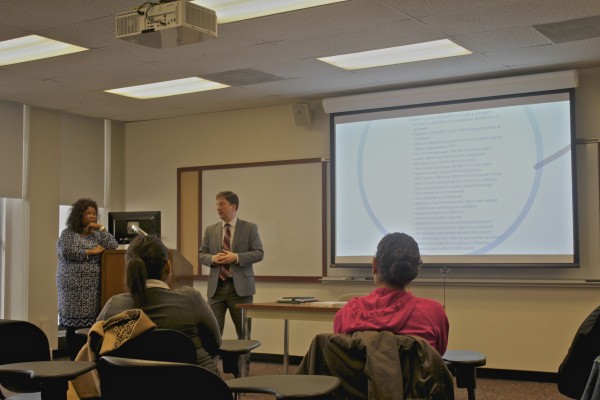Fordham CARE Event Elicits Little Turn Out
Dean Eldredge, the Dean of Students, and Ms. Jenifer Campbell, Director of Residential Life, lead a presentation and Q&A session on the policies that Fordham University has in place for reporting Title IX violations, which include sexual misconduct. (Jess Luszczyk /The Observer)
March 13, 2015
On March 11, just three days after the United Nations’ (UN) International Women’s Day, Dean of Students at Fordham College at Lincoln Center (FCLC), Keith Eldredge, and Director of Residential Life, Jenifer Campbell, led a discussion on Campus Assault and Relationship Education (CARE) and Title IX procedures.
Title IX is the legislation passed in 1972 that ensures gender equity in any education institution that receives federal funding. Campbell said, “There were 14 reported sexual assaults throughout all Fordham University campuses in 2013.” Learn more about the reporting of sexual assault at Fordham here.
Ten students in total attended the event sponsored by this campus’ Residence Hall Association (RHA), United Student Government (USG) and Commuter Students Association (CSA) and over half the students in attendance were affiliated or leaders of these three clubs. The event was originally scheduled on Thursday, March 5 during the activity block beginning at 11:30 a.m.
In a follow up email Eldredge wrote, “While I always like to reach as many students as possible, particular on the topic of Campus Assault and Relationship Education, if information learned at this event benefits a single student, I consider it a success.”
Members of USG, Louise Lingat, president, co-chair of Title IX committee and FCLC ’15, Jacob Azrilyant, vice president of operations and FCLC ’16 and Leighton Magoon, treasurer and FCLC ’17, agreed they think the snow really affected the turnout.
Lingat said, “I think one of the problems on campus is a breakdown in communication. People don’t understand what [sexual assault] policies are.” This event was supposed to bridge that communication gap.
“This event was generated from some discussions I had with student leaders in the Fall [2014],” Eldredge began the discussion. The Fordham CARE’s tabling where students were asked to fill out cards about how they take a stand against sexual misconduct and attach it to a display outside the Ram Cafe was also a result of those conversations. The display was up for about a week and can be seen at fordhamcares.tumblr.com.
“Sexual misconduct is becoming a more prominent conversation on college campuses which I think is long overdue,” Eldredge said.
“This is our first time doing a presentation together, so as we look at each other awkwardly, don’t worry that’s our style,” Eldredge said breaking the ice of the heavy topic. Eldredge and Campbell took turns going through each step in the process of reporting sexual assault and the different options the complainant has throughout, including having a formal investigation done by either or both or neither the University and the New York Police Department (NYPD). If a student does decide to pursue a University investigation, the student has the choice to report to the same sex security supervisor. Find more information about female security supervisor availability here.
“Rape is not about sex, it is about total power and domination,” Eldredge said. He also clarified the language used throughout the process. “Complainant” is the formal term used by guiding legislation to describe the student coming forward as having experience the assault while the respondent is used to describe the person accused of the assault. “At certain times in the process, we will refer to [complainants] as victims or survivors,” Eldredge said.
“A lot of folks are concerned about the word ‘victim,’ and I resonate with that,” Eldredge continued to say that it may re-victimize the person by calling them that. He clarified the only time he used “victim” is in the same context of anyone being a victim of a crime, like a robbery.” He continued, “I think through the process of healing, through the process of getting help, folks move from being a victim to a survivor.”
All information of the University procedure is available at www.fordham.edu/CARE.
“I want to get your ideas and I want to see what we can do together,” Eldredge said to students after completing the Prezi that he and Campbell constructed together.













